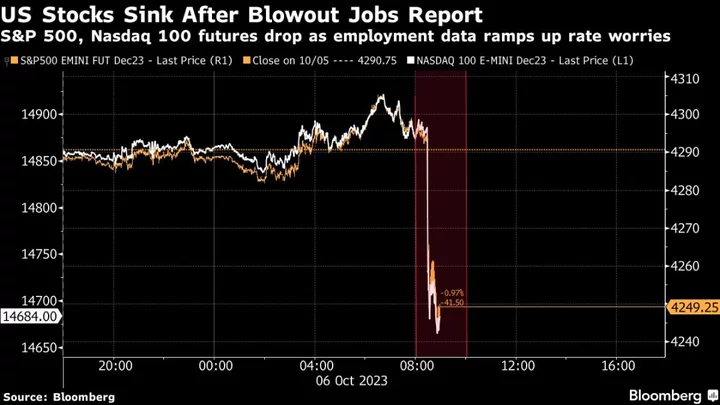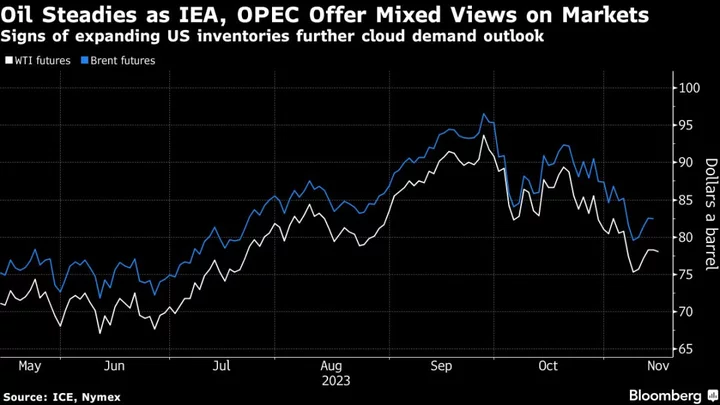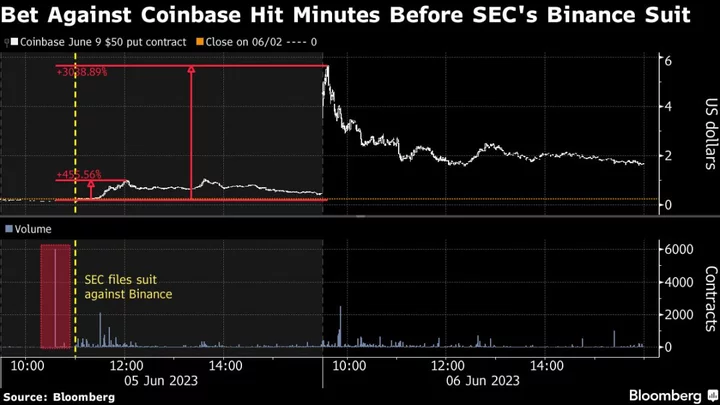The selloff in US stocks didn’t last long.
Dip buyers sensing an overreaction to the blowout US jobs report have managed to drive the S&P 500 Index to a gain, reversing losses of as much as 0.9%. The S&P 500 fell within 20 points of its average price over the past 200 days, a level where buyers tend to emerge. The rebound also happened as the selloff in Treasuries eased somewhat, though rates remain elevated across the curve.
Traders looking for silver linings in a hiring report that showed employers adding 336,000 jobs last month pointed to the economic signal it sends — companies confident enough to add to payrolls are more likely to deliver on profit targets. Another bright spot was the relatively modes gains in wages.
Read more: Fed Will Lean Toward Another Rate Hike After Blowout Payrolls
Whether good news is good news or good news is bad news is “one of the big oxymorons” on Wall Street now, according to Chris Zaccarelli, chief investment officer for Independent Advisor Alliance.
“The stock market is going to worry about even higher interest rates and the impact that will have on the consumer and on corporate profits,” he said. “The ironic thing is that a much stronger job market means much stronger consumer spending and an even longer time until we go into recession, both of which should be positive for corporate profits in the short term.”
Here’s how other Wall Street strategists and money managers reacted to the report:
James Hodgins, managing director and portfolio strategist at Stifel:
“These numbers are still suggestive of a soft landing path, at least in the next three to six months, and then it gets worse after that. Markets were very oversold coming into the jobs numbers. There was a lot of ‘crash’ talk, which usually means sentiment is quite bearish. These numbers may mean a little bit higher rates, but rates have already gone up so much, that is kind of baked into equities. Yes, this is a positive jobs number, but that means we are more into the soft-landing territory, at least for now.”
Nick Giacoumakis, president of NEIRG Wealth Management:
“The savior today was that there wasn’t a big uptick in wage inflation. If that had happened combined with a strong jobs number, it would have been a one-two punch for the stock market. Luckily, the unemployment number didn’t change much either. You can look at this as the glass half empty, or the glass half full. Even though the employment data was considerably higher, at least this is a scenario that bodes well for the economy and signals that we’re likely not going into a recession.”
Greg Bassuk, chief executive officer at AXS Investments:
“This week’s market has been reflective of the see-saw ride investors are on, with daily swings between bullish to bearish sparked by the uniquely mixed economic data reports. All eyes are laser-focused on next week’s CPI and PPI reports showing September’s inflation levels which will be a key driver of the Fed’s next rate hike decision.”
Bryce Doty, senior portfolio manager at Sit Investment Associates:
“Investors were looking for a job report that is weak enough to keep the Fed from raising rates while also not being so weak as to stoke fears of a hard landing. This report is clearly going to put a rate increase firmly back on the table. We have been in the camp that more supply of workers means less wage inflation and that trend continues with hourly earnings only rising 0.2%. But the Fed has things backwards and believes more job growth is inflationary.”
Candice Tse, global head of strategic advisory solutions at Goldman Sachs Asset Management:
“Today’s unexpectedly strong payrolls number shows that while US labor market softening has made incremental progress, the balance between supply and demand of workers will keep the Fed focused on managing inflation. This labor number, the last before the November Fed meeting, along with further disinflation will not only inform the Fed’s decision in November, but will also be an important input to its timeline for rate cuts in 2024.”
The tenor on Wall Street was different in the immediate aftermath of the report, which landed at 8:30 a.m. in New York.
Matt Peron, director of research at Janus Henderson Investors:
“A strong payroll report this morning will continue to put pressure on equity markets, which will likely look past the moderating wage growth and focus on ‘too-hot’ job creation. This will keep rates higher for longer and challenges the equity market soft-landing narrative as well as valuations. We’re still forecasting a slowdown, but persistent strong data in the service economy is certainly nudging the risk to the downside due to the potential of more aggressive policy.”
Robert Schein, chief investment officer at Blanke Schein Wealth Management:
“Friday’s jobs report suggests that the labor report remains very strong and cements the case for an additional Fed rate hike this year, and it also likely delays the pace of eventual rate cuts. The stock market is in the midst of a correction as it adjusts to rising bond yields, sticky inflation and the realization that even if the Fed stops raising interest rates, they are likely to keep them at this elevated level for quite some time.”
Seema Shah, chief global strategist at Principal Asset Management:
“The blow-out jobs report is maybe not so good news for markets. Not only does today’s report indicate the economy is almost too hot to handle and the Fed will need to respond with more rate hikes, it reinforces the higher for longer narrative that has been spooking bond markets for the past few weeks. Markets want the perfect landing and instead they are facing an upward sloping path.”
--With assistance from Elena Popina, Norah Mulinda, Matt Turner, Jessica Menton and Esha Dey.
(Updates with additional comments, chart, and index moves.)









